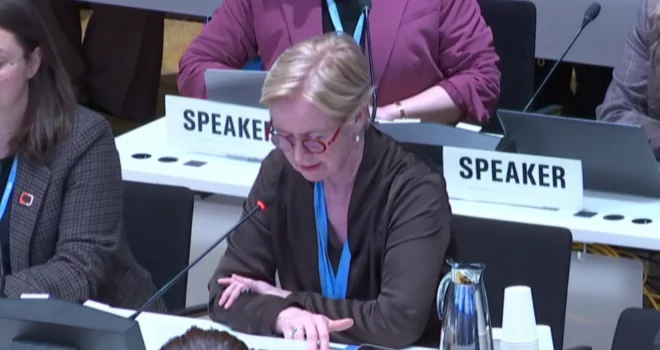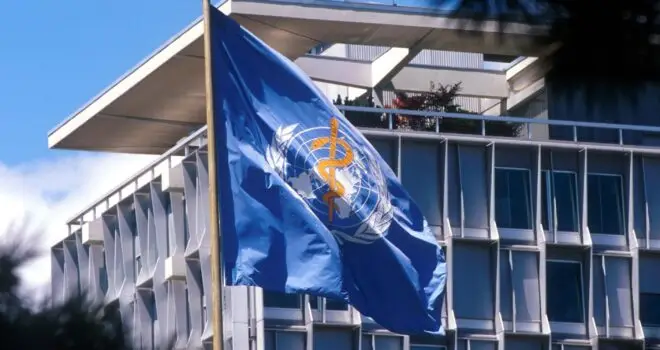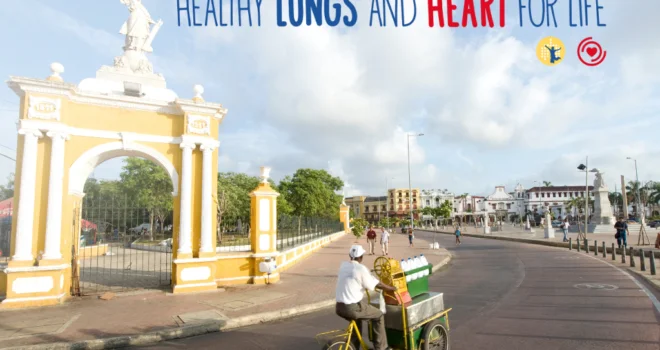This is an open letter to universities and all education stakeholders from the WHO-CS Working Group to advance action on Health and Climate Change, of which the World Heart Federation is a proud member.
Global health challenges are emerging as environmental and climatic changes disrupt all societies worldwide. Health systems and patient needs will be very different from the past. Health professionals must be prepared to recognize and address the health risks and impacts of climate change and to ensure functioning healthcare systems in a climate-changed future.
We, the WHO-Civil Society Working Group to Advance Action on Climate Change and Health, urge the deans, academics, managers and other teaching staff of health professional educational institutes, as well as the associated accrediting, examination, and licensing bodies to ensure graduating health professionals are prepared to identify, prevent, and respond to the health impacts of climate change and environmental degradation.
Human health like cardiovascular disease is inextricably linked to planetary health. From floods to wildfires to heat emergencies, climate change is already impacting health and health systems with disadvantaged and Indigenous communities being affected the most. Health professionals have an ethical and professional responsibility to be familiar with both current and future climate change and environmental health threats in order to fulfill duties to their patients and to society.
Responses to a global health emergency, whether a pandemic or a climate disaster, air pollution or biodiversity loss, need resilient health systems and a highly proactive, skilled and committed health workforce. One of the key strategies to achieve resilient, low-carbon health systems is to strengthen educational and training programs for all health professionals. Health systems must also do their part to reduce the global greenhouse gas emissions produced in the delivery of healthcare services.
Universities and education stakeholders must update and evolve programs such that they address risks from climate change as well as opportunities to improve the global public health response to climate change. A recent survey showed climate change educational programs for future doctors are lacking worldwide, and are often student-led. Another global survey with 160 health professional schools indicate many barriers are being faced in integrating climate and health content into curricula, including lack of institutional support.
To empower health professionals with the knowledge and skills they need to respond to climate change, we present the following calls to action:
- Integrate climate and health competencies into all health professional curricula, accreditations, and continuing professional development;
- Provide a health lens to support the development of educational programs on climate change and health in other sectors to foster multi-sectoral collaborations;
- Advocate for and provide additional funding and resources for climate and health research and education;
- Share educational resources to expand educational opportunities.
We acknowledge that local settings and frameworks vary greatly due to different political, socio-economic, health care and education systems and that the above recommendations can be contextualised for uptake in each setting. As a first step, we invite institutions, academic leadership, faculty, students, and alumni to commit to make climate change a part of the health curriculum at their own institution to ensure a safe and healthy future for all.
Signed and endorsed by members and alumni of the WHO Civil Society Working Group to advance action on Climate Change and Health:
- ABRASCO
- Climate and Health Alliance
- Canadian Association of Physicians for the Environment
- Health Care Without Harm
- Indigenous Allied Health Australia
- IFMSA
- IPA
- International Pharmaceutical Students’ Federation
- Vital Strategies
- WFPHA
- World Heart Federation
- World Medical Association
Examples of existing courses and resources
Appendix I: Example courses on climate and health
- Caribbean Climate and Health Responders Course. This is a 10-week free online certificate course, created by EarthMedic, the Global Consortium on Climate and Health Education and the Caribbean Institute for Meteorology and Hydrology (CIMH) that aims to provide interdisciplinary health care professionals with the knowledge and tools to effectively respond to the climate and health crisis in their local communities throughout the Caribbean region: https://www.publichealth.columbia.edu/research/global-consortium-climate-and-health-education/caribbean-climate-and-health-responders-course
- Climate and Health Responders Course for Health Professionals. This 8-week free certificate-based online program, taught by world experts, is designed to equip health professionals, health educators and climate leaders with the knowledge needed for transformative action. Participants will receive up to 16, no-cost, continuing education hours through this program. This course was created by the Global Consortium on Climate and Health Education, the U.S. National Oceanic and Atmospheric Administration (NOAA), Health Canada and Project Echo: https://www.publichealth.columbia.edu/research/global-consortium-climate-and-health-education/climate-and-health-responder-course-health-professionals
- Climate and Health Responders Course for Latin America. This is a 5-week free, 15-hour online certificate course. The course aims to engage the public health research and academic communities to facilitate climate and health research used to inform health and policy decisions throughout Latin America. Spanish is the primary language of this course and English translation will be provided. This course was created by the Pan American Health Organization, the Global Consortium on Climate and Health Education, and the InterAmerican Institute for Global Change Research (IAI): https://www.publichealth.columbia.edu/research/global-consortium-climate-and-health-education/climate-and-health-responder-course-latin-america
- Keeping the community safe through Humanitarian Youth Clubs in Kiribati. The Humanitarian Youth Club initiative increases awareness of sexual and reproductive healthcare during a crisis and builds connections between youth leaders and the communities in which they live. Youth volunteers are trained in sexual and reproductive healthcare priorities in an emergency and help prepare their community for the impact of king tides and other crises: https://worldhealthorg-my.sharepoint.com/:p:/g/personal/egorovaa_who_int/EUkG5bryd_hKtDGXAswg8UwB4xo9TRqzBZZupB7mt7QFPA?e=eCuFhk
- Training climate and health leaders in the Caribbean. A fellowship programme at the University of the West Indies is training a cohort of Caribbean Climate Change and Health leaders with the knowledge and skills to be ‘agents of change’. The program focuses on promoting an interdisciplinary One Health approach, tackling the environmental determinants of health, and the prevention and control of COVID-19: https://worldhealthorg-my.sharepoint.com/:p:/g/personal/egorovaa_who_int/ERnhOBzu67dGlGBKCBdUgWABV1qhO4YOE0WooO1IZJ8FNQ?e=RxVgQk
- MOOC course on Planetary Health from Brazil. In 2020, the pilot of the Massive open online course (MOOC) on Planetary Health was launched in Brazil at the TelessaúdeRS-UFRGS platform. The course focuses on the topic of Climate Change and the consequences of human life on Earth. The course was evaluated and adapted for the next versions in 2021. The Brazilian Portuguese version was relaunched and was translated into English. The course design was inspired by the image of organic life, taking shape naturally from roots and rhizomes. The course has an important dimension on scientific knowledge but also has emotional, creative and affective dimensions. In 2021, in collaboration with the World Organization of Family Doctors (WONCA) a new version of the course was launched: Planetary Health for Primary Care. All courses have a certification and are completely free of charge, based on the right to access education: https://www.ufrgs.br/telessauders/cursos/; https://www.ufrgs.br/telessauders//documentos/cursos/saudeplanetaria/curso_saude_planetaria_manual_20201021_dpa.pdf; https://www.ufrgs.br/telessauders/documentos/cursos/course_manual_wonca_.pdf
- MOOC course on “Global Health at the Human-Animal-Ecosystem Interface”. The course was produced by the University of Geneva in collaboration with WHO, involving more than 30 top experts from over 20 academic and research institutions and international organisations based in Geneva, Paris, Montreal and the world. This MOOC proposes a dynamic, international and interdisciplinary programme based on the One Health approach (human- animal- environmental dimensions), with one of the modules dedicated to “Management of Ecosystems under Global Changes: Implication for Human Health”. The course has attracted more than 10,000 learners from around the world and was included in the University of Geneva’s curriculum. Link to the teaser: https://www.youtube.com/watch?v=WT7-cC21uLU&feature=youtu.be&list=PLnZcy8OmLJ2wB7Fa8Zlh_-QKYIwrVhTir ; Link to the course: https://www.coursera.org/learn/global-health-human-animal-ecosystem
- “Core Competencies” developed by the GCCHE
The Global Consortium on Climate and Health Education (GCCHE), consisting of over 250+ health professional schools in over 40 countries, has created and vetted a framework for the “core competencies” all health professionals must have. It has been endorsed by the American Association of Medical Colleges, the Association of Schools and Programs of Public Health (North America), and the Association of Schools and Programs of Public Health in the European Region: https://www.publichealth.columbia.edu/research/global-consortium-climate-and-health-education/core-competencies-0
Useful resources
Global Consortium on Climate and Health Education (GCCHE) online resources:
https://www.publichealth.columbia.edu/research/global-consortium-climate-and-health-education
Global Climate and Health Alliance (GCHA) website: https://climateandhealthalliance.org
Intergovernmental Panel on Climate Change (IPCC) 6th Assessment Report: https://www.ipcc.ch/
Planetary Health Alliance Educational resources: https://planetaryhealthalliance.org/education/
Planetary Health Course (English): https://www.ufrgs.br/telessauders/cursos/
Planetary Health for Primary Care (English): https://www.ufrgs.br/telessauders/cursos/
Saúde Planetária (Brazilian Portuguese): https://www.ufrgs.br/telessauders/cursos/
UN Climate Change Learn website: https://www.uncclearn.org
Useful books for adding to course reading lists: Haines & Frumkin; Myers & Frumkin
World Health Organisation (WHO) Capacity Building on Climate Change and Health Toolkit: https://www.who.int/activities/building-capacity-on-climate-change-human-health/toolkit


